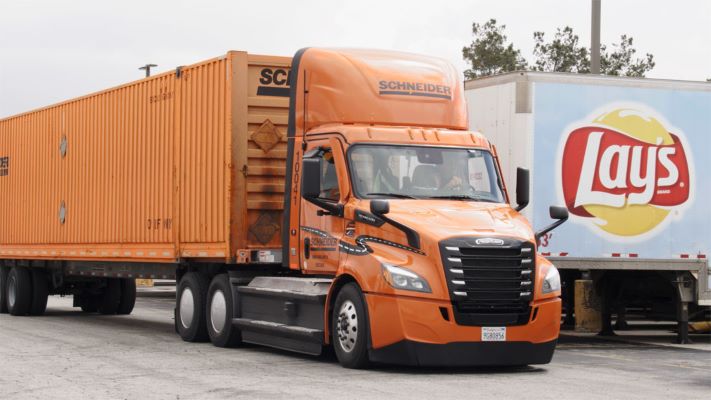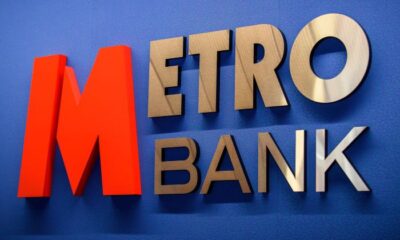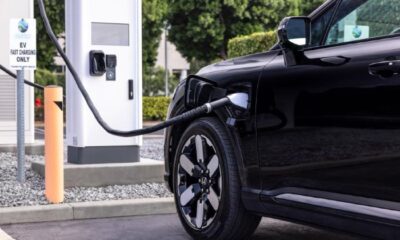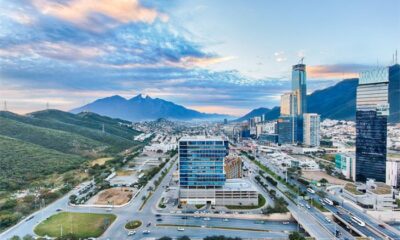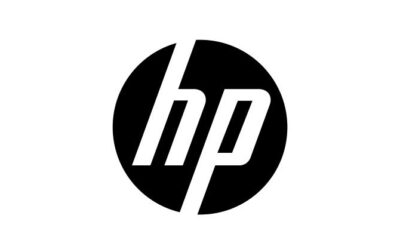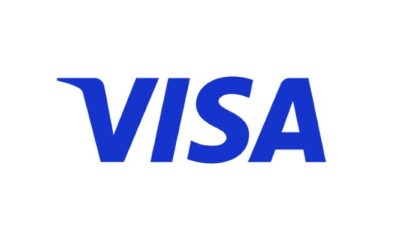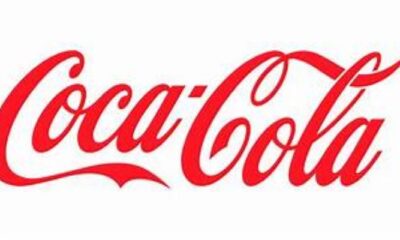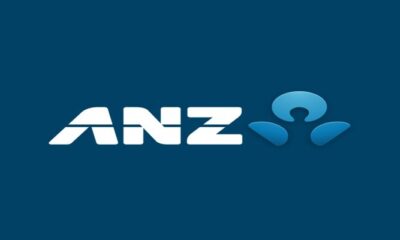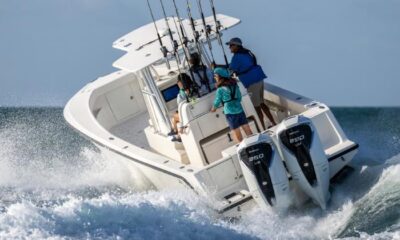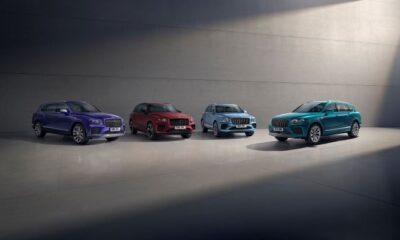Frito-Lay North America (FLNA) announces its first-ever third-party shipment on an electric vehicle with Schneider National Inc. (NYSE: SNDR), a premier multimodal provider of transportation, intermodal and logistics services. This is the first third-party transportation shipment on an electric vehicle (EV) for PepsiCo globally and establishes FLNA and its beloved snack products as the first to contract transport on Schneider’s electric truck fleet of Freightliner eCascadias.
“Today’s milestone shipment underscores the importance of cross-industry collaboration in building a more sustainable food system and achieving Frito-Lay and PepsiCo Positive’s goal of net-zero emissions by 2040,” said David Allen, vice president and chief sustainability officer, PepsiCo Foods North America. “As a company with massive scale, Frito-Lay looks for opportunities to create positive change – but we can’t do it alone. By working with Schneider, we are taking an important step forward in our efforts to reduce value chain emissions and move our snack products in a more sustainable way.”
An emissions reduction of more than 70 percent[1] is expected this year from the initial EV routes, versus the same shipments on diesel trucks, which is equivalent to eliminating more than 180,000 miles driven by gasoline-powered passenger vehicles[2] from the road. Initial shipments on Schneider’s growing Freightliner eCascadia fleet will be intermodal inbound and outbound dray moves in southern California, including service to Frito-Lay’s Rancho Cucamonga facility.
“As we roll out our fleet of almost 100 new battery electric trucks, we’re thrilled to offer a cleaner mode of freight transportation to valued customers like Frito-Lay, who share our goal of operating in ways that are environmentally responsible,” said Rob Reich, executive vice president and chief administrative officer, Schneider. “For decades, we have been committed to improving sustainability at Schneider, and we’re proud to now be able to positively impact our customers’ operations as well. Working together, we are decreasing the carbon footprint of shipments in southern California and making a positive difference.”
Frito-Lay and PepsiCo’s commitment to net-zero emissions by 2040 is guided by PepsiCo Positive (pep+), an end-to-end transformation that puts sustainability at the center of how the company will create growth and value by operating within planetary boundaries. With third-party transportation and distribution forming 20 percent of PepsiCo’s emissions footprint, collaboration with partners from whom these emissions originate is critical. Frito-Lay’s partnership with Schneider lays important groundwork for an expansion of low- or zero-emissions vehicle use within its third-party transportation footprint.
Within its company-owned fleet, Frito-Lay is also making significant advancements. Among them is the recent transformation of one of Frito-Lay’s largest manufacturing facilities, located in Modesto, Calif., as the first to implement site-wide alternative fuel vehicles. To serve the company’s hometown market of Dallas-Fort Worth, Frito-Lay also introduced 40 100% electric, zero-emissions route trucks in 2022.
To learn more about pep+ and progress towards net-zero goals, visit PepsiCo.com/PepsiCoPositive.
About Frito-Lay North America
Frito-Lay North America is the $23 billion convenient foods division of PepsiCo, Inc. (NASDAQ: PEP), which is headquartered in Purchase, NY. Frito-Lay snacks include Lay’s and Ruffles potato chips, Doritos and Tostitos tortilla chips and branded dips, Cheetos snacks, Stacy’s pita chips, PopCorners popped-corn snack, SunChips multigrain snacks and Fritos corn chips. The company operates 30+ manufacturing facilities across the U.S. and Canada, more than 200 distribution centers and services 315,000 retail customers per week through its direct-store-delivery model. Learn more about Frito-Lay at the corporate website, www.fritolay.com, on Twitter (@fritolay), on Instagram (@fritolay) and on Facebook (Frito-Lay).
About Schneider National
Schneider is a premier multimodal provider of transportation, intermodal and logistics services. Offering one of the broadest portfolios in the industry, Schneider’s solutions include Regional and Long-Haul Truckload, Expedited, Dedicated, Bulk, Intermodal, Brokerage, Warehousing, Supply Chain Management, Port Logistics and Logistics Consulting.
With $6.6 billion in annual revenue, Schneider has been safely delivering superior customer experiences and investing in innovation for over 88 years. The company’s digital marketplace, Schneider FreightPower®, is revolutionizing the industry giving shippers access to an expanded, highly flexible capacity network and provides carriers with unmatched access to quality drop-and-hook freight – Always Delivering, Always Ahead.
For more information about Schneider, visit Schneider.com or follow the company socially on Facebook, LinkedIn and Twitter: @WeAreSchneider.
Cautionary Statement
Statements in this release that are “forward-looking statements” are based on currently available information, operating plans and projections about future events and trends. Terminology such as “aim,” “anticipate,” “believe,” “drive,” “estimate,” “expect,” “expressed confidence,” “forecast,” “future,” “goal,” “guidance,” “intend,” “may,” “objective,” “outlook,” “plan,” “position,” “potential,” “project,” “seek,” “should,” “strategy,” “target,” “will” or similar statements or variations of such words and other similar expressions are intended to identify forward looking statements, although not all forward-looking statements contain such terms. Forward-looking statements inherently involve risks and uncertainties that could cause PepsiCo’s actual results to differ materially from those predicted in such forward-looking statements. Such risks and uncertainties include but are not limited to: damage to PepsiCo’s reputation or brand image; water scarcity; disruption of PepsiCo’s manufacturing operations or supply chain, including increased commodity, packaging, transportation, labor and other input costs; climate change or measures to address climate change; failure to comply with applicable laws and regulations; and potential liabilities and costs from litigation, claims, legal or regulatory proceedings, inquiries or investigations..
For additional information on these and other factors that could cause PepsiCo’s actual results to materially differ from those set forth herein, please see PepsiCo’s filings with the Securities and Exchange Commission, including its most recent annual report on Form 10-K and subsequent reports on Forms 10-Q and 8-K. Investors are cautioned not to place undue reliance on any such forward-looking statements, which speak only as of the date they are made. We undertake no obligation to update any forward-looking statement, whether as a result of new information, future events or otherwise.
[1] Percentage determined through comparison of expected mileage in 2023.
[2] Equivalency sourced from U.S. Environmental Protection Agency’s Greenhouse Gas Equivalencies Calculator. Passenger vehicles are defined as 2-axle 4-tire vehicles, including passenger cars, vans, pickup trucks, and sport/utility vehicles.
Source – FritoLay

